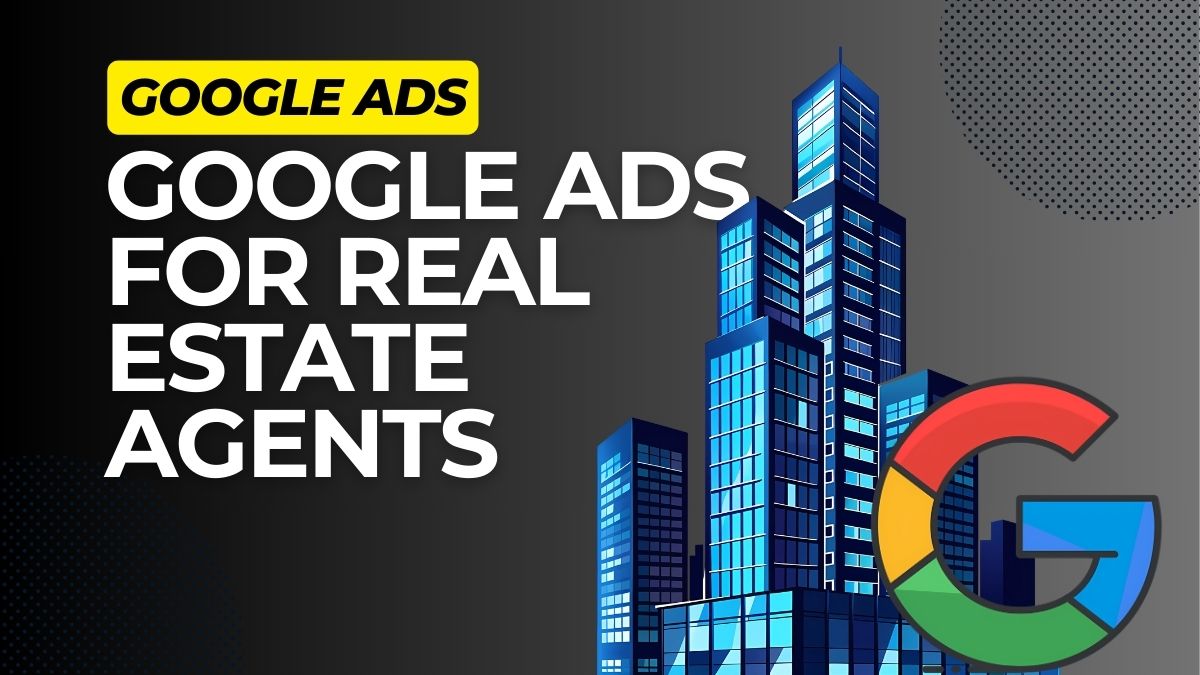Looking to grow your business online in a super competitive market like real estate?
The trick to getting in touch with new quality leads without having to farm neighbourhoods is capturing the attention of people who are actively seeking your services right now using Google Ads campaigns.
I'm gonna explain now how I used Google Ads for my clients in many different industries to generate high-quality leads and how you can apply these strategies to your real estate business.
Whether you're targeting local buyers and sellers or expanding your reach to new markets, Google Ads can be a game-changer for your lead generation efforts.
How do Google Ads work in the real estate industry?
If you're reading this article, you probably already have a basic idea of how Google Ads works. Maybe you're not an expert, and perhaps you don't have much experience with the platform yet.
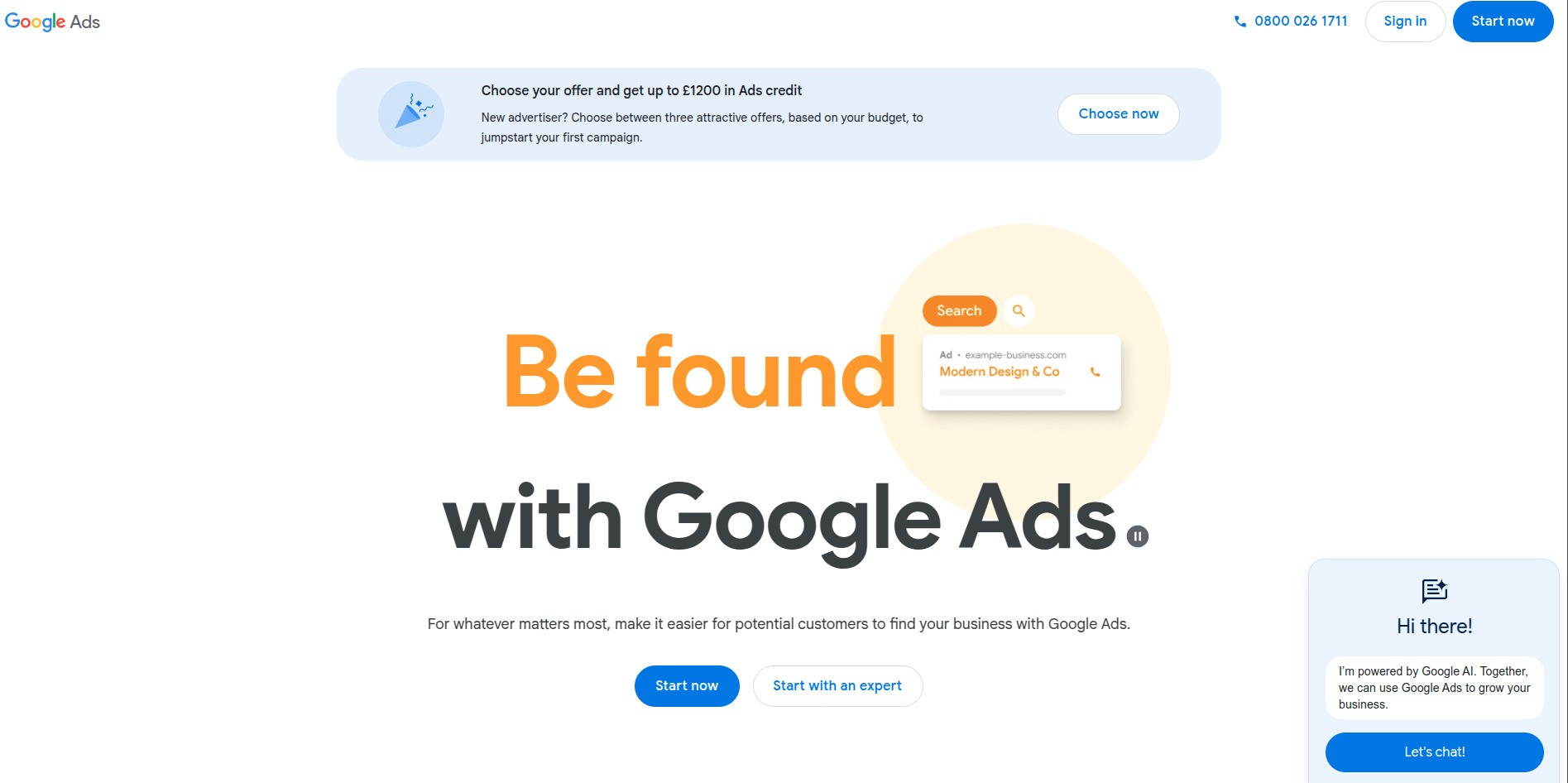
That said, I think it's essential to provide a quick introduction to how the algorithm and advertising system operate, especially since Google frequently makes updates and changes to its platform.
First things first, for those who are wondering, yes Google Ads is used by many real estate agents worldwide.
The competition in some areas can be very high and it requires more attention and expertise to optimize your investment, but there are also other areas where the ad cost is much lower and they make the market more accessible with smaller budgets and less effort.
1. The algorithm that works for you overnight
Have you ever searched for something on Google and noticed websites or widgets with a tagline that says "Sponsored"? If so, those are businesses or individuals promoting their services using Google Ads.
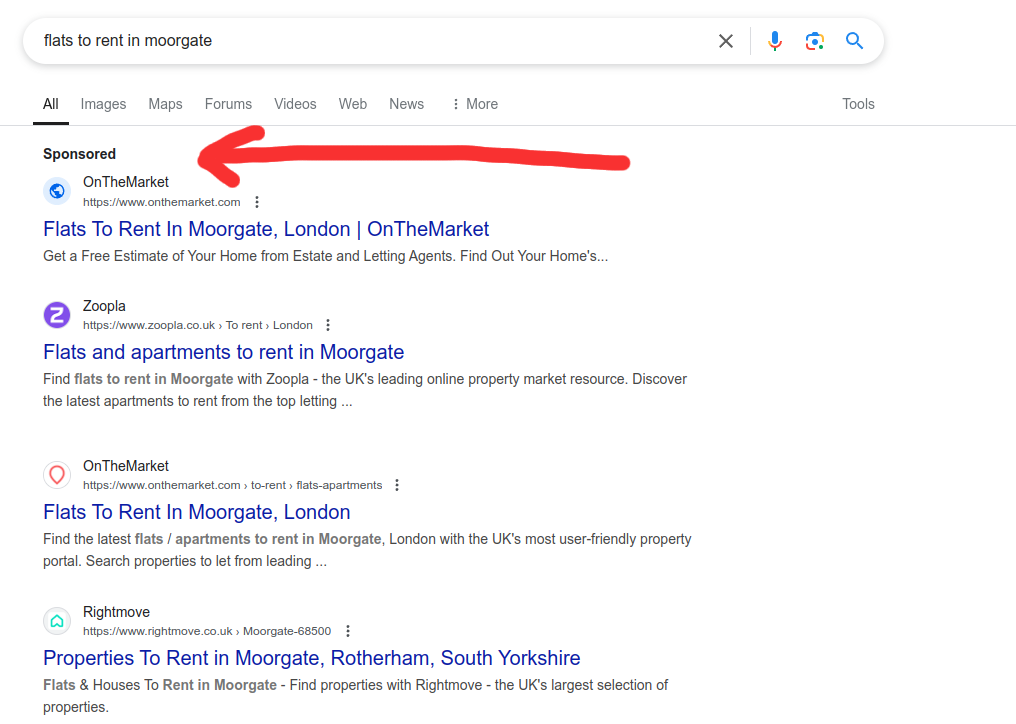
By paying to appear at the top of search results, they gain immediate visibility and drive traffic to their websites as soon as their campaigns go live.
These businesses don’t need to spend months or years optimizing their websites to attract a decent amount of visitors. Instead, they set an advertising budget, and their campaigns automatically work around the clock to generate new leads.
Bid a certain amount of budget for a group of keywords that users search for on Google, and you'll appear at the top of the results at any time of the day or night.
2. How to find a profitable audience
Google Ads is pretty much all about discovering and testing keywords that people search for when they look for your services.

To find the right keywords for your campaigns, start by analyzing your own website and product offerings.
Think like your customers: What specific terms would they use to find what you’re selling?
For example, if you’re a real estate agent, avoid broad terms like “homes for sale” and instead target buyer-oriented keywords like “3 bedroom homes for sale in london” or “flats to rent in moorgate”.
These specific keywords indicate higher intent and are more likely to attract ready-to-buy customers. As you can see the keyword planner from Google Ads indicates that there are 10 users every month that search for “flats to rent in moorgate” on average.
So now if you own a flat in Moorgate, London, you have an opportunity that I gave you away for free. 😊
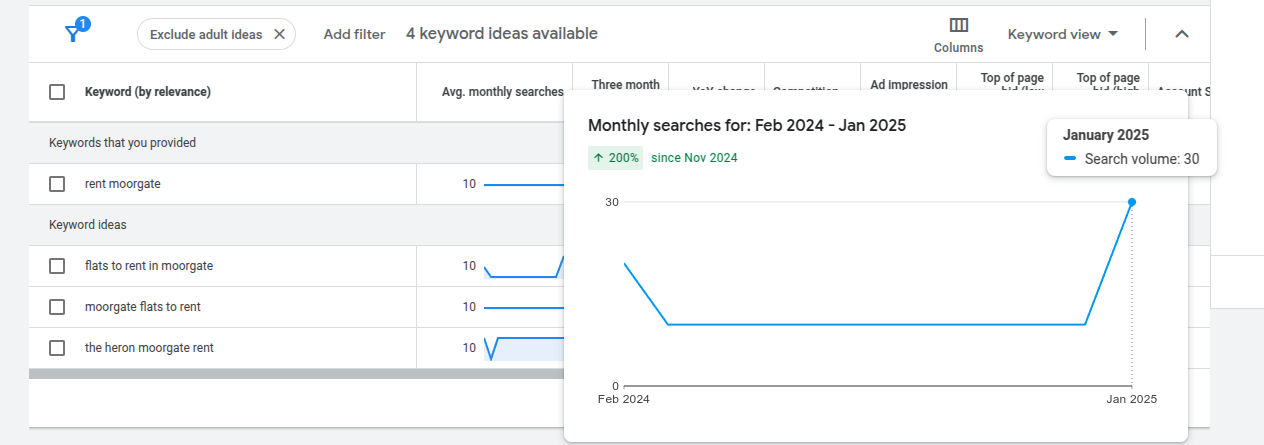
Now, you may be thinking that 10 users a month a quite a few, but if you come up with a reasonable amount of keywords like this, then you'll have a big group of keywords that will drive a considerable amount of high-targeted visitors every day.
Adding modifiers like “buy”, “best” or “near me” can further refine your list and capture high-intent searches.
Next, research your competitors to uncover additional keyword opportunities.
Visit their websites and analyze the language they use to describe their products or services.
You might discover phrases or terms you hadn’t considered, such as “move-in ready homes” or “foreclosure properties.” Competitive analysis not only helps you identify gaps in your strategy but also ensures you’re staying relevant in your market.
3. How a Google Ads campaign is structured
A Google Ads campaign is structured in a hierarchical way to maximize efficiency and targeting. At the top level, your Google Ads account can contain multiple campaigns, each tailored for different goals, such as search, display, or video ads.
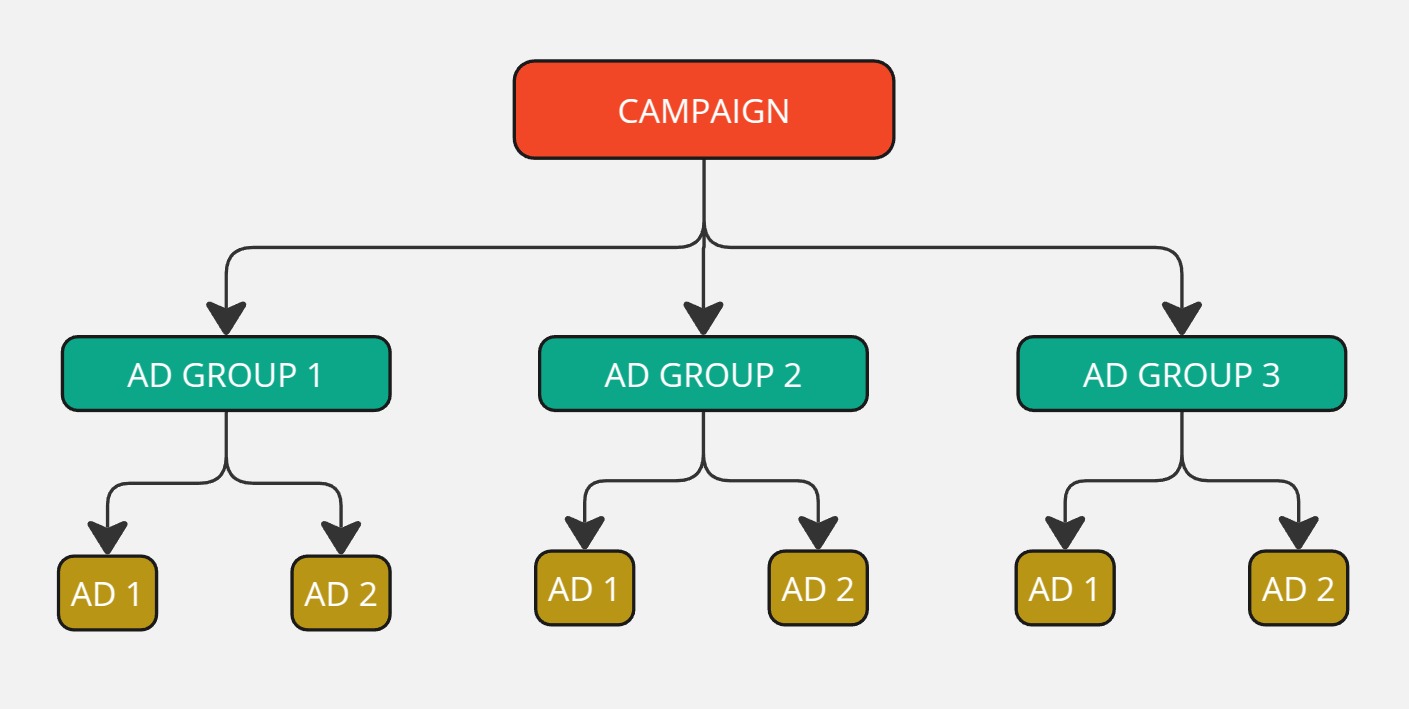
Within each campaign, you'll create multiple ad groups, which serve as containers for related ads and keywords. This setup ensures that ads are displayed based on search intent, improving relevance and click-through rates.
For real estate agents, a well-structured campaign might include separate ad groups for different locations or property types (e.g., "luxury homes in miami" vs. "affordable condos in chicago").
Each ad group contains specific keywords and ads that match the audience’s intent, leading them to a highly relevant landing page. This structured approach allows real estate professionals to generate leads effectively, whether targeting local buyers or expanding their reach nationwide.
4. The auction system
Every time a user performs a search on Google, an ad auction takes place behind the scenes to determine which ads will appear and in what order.
This process is not solely based on how much an advertiser is willing to pay per click, but also on the relevance and quality of the ad itself.
The auction works by evaluating three key factors: the advertiser’s maximum bid (the highest amount they’re willing to pay per click), the quality score of the ad (which includes expected click-through rate, ad relevance, and landing page experience), and the impact of ad extensions (such as callouts and site links).
For example, if two real estate agents are competing for the keyword "homes for sale in miami," the one with a higher quality score may win a higher ad position while paying less per click than the competitor with a lower quality score.
Google rewards advertisers who create highly relevant and engaging ads by allowing them to rank better in the auction at a lower cost. This system ensures that users see the most useful and relevant ads, while advertisers get the best return on investment for their budget.
How much a real estate company should invest on Google Ads?
Determining the right budget for a Google Ads campaign depends on business goals, target market, competition level, and location.
A common mistake is setting a budget too low, such as $5 per day, which often results in minimal ad impressions and insufficient data for optimization.
Since Google Ads operates on a cost-per-click (CPC) model, and real estate-related keywords are highly competitive, a low budget may not allow ads to appear frequently enough to attract leads.
A good rule of thumb is to allocate a budget at least 10 times the average CPC. For real estate, CPCs often range between $1 to $10 on average, meaning a daily budget of $5 may only generate one or two clicks, which is unlikely to produce consistent results.
The cost is usually a bit lower in less competitive locations.
Instead, a real estate business should consider starting with a budget of around $500 per month. This amount provides enough room to gather meaningful data, optimize campaigns, and improve lead generation efforts over time.
For those with a limited budget, it's best to focus on highly targeted, high-intent keywords and local campaigns to maximize return on investment.
Investing in Google Ads is not just about ad spend but also about learning from data, refining targeting strategies, and continuously optimizing ad performance to generate high-quality real estate leads.
Convert more leads with a captivating website or landing page
Running Google Ads is only 1/4 of the battle in generating real estate leads—the rest is about convincing potential clients to choose you over the competition. Your website plays a crucial role in this process, as it is often the first impression visitors get of your business.
A corporate, generic, or outdated website can drive potential leads AWAY, making them opt for a competitor with a more engaging and trustworthy online presence.
To convert more visitors into leads, your website should highlight what makes you unique—your unique selling proposition (USP).
This is the key element that sets you apart and answers the critical question: “Why should a potential client choose you instead of someone else?”.
If your site looks like every other real estate website with the same cookie-cutter images and vague promises, you are missing an opportunity to stand out.
Good website headlines:
-
"Sell Your Home 30% Faster – Replicate Our Proven Strategies That We've Been Using for Over 10 Years!"
Why it’s good: Creates urgency and highlights a clear benefit. -
"Buy a Home with 1% Commission – Save Thousands!"
Why it’s good: Focuses on a tangible financial advantage for buyers.
Bad website headlines:
-
"Welcome to XYZ Realty – Your Trusted Partner"
Why it’s bad: Too generic and doesn’t differentiate the business. -
"Find the Perfect Home with Us"
Why it’s bad: Vague and uninspiring, with no clear benefit or action step.
A well-designed, engaging website should be visually appealing, easy to navigate, and packed with compelling content that builds trust.
Showcase your expertise, highlight client testimonials, and use clear calls to action that encourage visitors to reach out.
A unique offer—such as a free home valuation, exclusive listings, or a guarantee—can make a significant difference in persuading potential buyers and sellers to choose your services. In short, your Google Ads campaign can drive traffic, but a captivating website is what turns that traffic into real leads.
Move on and start promoting your real estate company
Now that you understand how Google Ads can transform your lead generation efforts, it’s time to take action. Start by defining your target audience, crafting high-intent keywords, and structuring your campaigns to maximize the return on the investment.
If you’re not an expert or don’t have the time to manage campaigns effectively, don’t worry—that’s where we come in.
As Google Ads specialists, we’ve helped different business in many very different industries.
From campaign setup to ongoing optimization, I’ll handle the heavy lifting so you can focus on closing deals. Ready to get started? Let’s turn your Google Ads into a lead-generating machine.
Conclusion
Google Ads is a powerful tool for real estate agents looking to attract high-quality leads locally or in new markets.
With the right strategy, you can outshine competitors and grow your business exponentially. Don’t wait—take the first step today and watch your real estate business thrive in 2025 and beyond.
